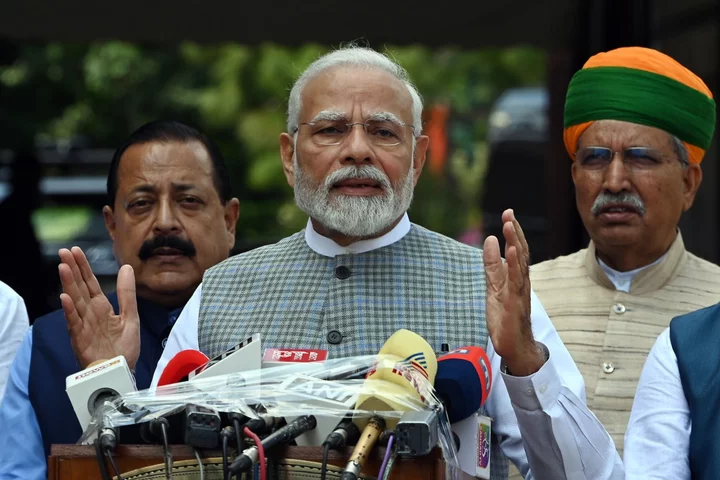Prime Minister Narendra Modi promised “historic decisions” in a brief and out-of-turn parliament session, triggering speculation about what could be on the cards months before national elections are due.
The five-day gathering of lawmakers started Monday with a limited agenda comprising non-controversial bills. Modi’s comments however fueled talk that he might spring a surprise, with guesses ranging from a long-pending legislation to reserve a third of parliament seats for women, to changing the name of the country and even calling for early polls.
“This session is short, but based on the timing, it is very big,” Modi told reporters Monday. “This is a session of historic decisions.”
Opposition parties raised concerns that Modi — who holds a majority in the lower house — might ramrod through his agenda. Here are the key items that could be discussed:
Women’s Reservation
The Women’s Reservation Bill, first introduced in 1996, seeks to reserve 33% of seats for women in the lower house of parliament as well as state assemblies. The bill hadn’t progressed as critics say it isn’t democratic and could lead to a lopsided legislature as there are already quotas for certain castes and tribes.
At an all-party meeting Sunday, some opposition parties and allies of Modi’s Bharatiya Janata Party urged the government to take up the legislation. Modi’s cabinet cleared the bill at a meeting late Monday, NDTV reported, without saying where it got the information.
A larger share of women than men turned up to vote in the 2019 national elections, which was swept by the BJP. At the time, about 46% of women voted for the BJP-led alliance compared with 44% men, according to the India Today-Axis post-poll study, and two other studies show more women seem to have voted for the BJP than men in all four states the party won in 2022.
Clubbing Elections
Some local media reports have speculated that Modi could decide to call for early elections after he formed a panel to review a proposal to hold Indian federal and state polls together. Choosing to combine the elections would mean the national vote could be moved forward to this year from the summer of 2024. Time is tight though as rival political parties and state governments need to agree to the proposal and the constitution must be amended.
India to Bharat
Ever since several opposition parties banded together into an alliance with the acronym I.N.D.I.A., Modi’s government has been increasingly using the colloquial name for the country — Bharat — in formal communications. That’s triggered speculation Modi might choose to officially change the nation’s name, which would also appease his nationalist voter base. Such an amendment would need a two-third majority in the lower and upper houses of parliament.
READ: Why Modi Is Using Bharat Instead of India and What It Means
Uniform Civil Code
The government has initiated consultations to explore replacing India’s religion-based marriage and inheritance laws with a singular civil code, which would be uniform across all religions. It has been on the BJP’s priority list during its election campaigns. Previous governments shied away from taking this step, fearing the anger of voters from the Hindu majority as well as minority Christian and Muslim communities.
READ: Modi Weighs Replacing Religion-Based Laws Ahead of 2024 Polls
J&K Statehood
In a controversial move in 2019, the Indian government downgraded Jammu & Kashmir, the country’s only Muslim-majority state, to a federally controlled region, ending its decades-long autonomy. It recently indicated restoration of statehood for the region is on the cards but may take time.
Author: Swati Gupta, Bibhudatta Pradhan and Eltaf Najafizada

